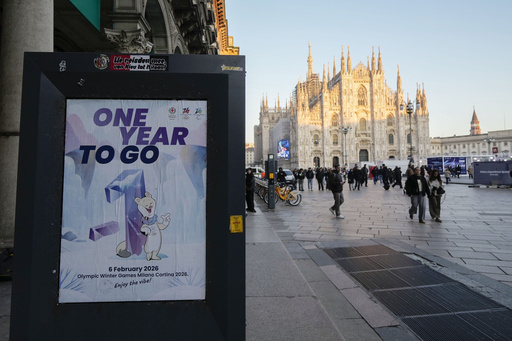
TORONTO — Isabelle Weidemann, the Canadian speed skater who succeeded at the Beijing Olympics, bringing home three medals and proudly carrying the national flag in the closing ceremony, finds herself facing significant financial challenges. The 29-year-old from Ottawa has revealed that she is dealing with personal debt, largely due to costs that her national sport organization can no longer support.
Weidemann expressed her concerns about the current state of sports funding in Canada, remarking, “Even at this top level, having achieved three Olympic medals and bearing our flag, one hopes to emerge from it without substantial debt. Unfortunately, it’s distressing to think that we struggle even to afford groceries, training equipment, and other essentials necessary for competing on a global stage.” The disparity in funding and support for athletes is evident, and the financial burden has become increasingly difficult to bear.
Joe Morissette, the CEO of Speed Skating Canada, acknowledged that his organization has had to scale back significantly. He stated, “We’ve drawn back in quite a few areas over the years. When funding remains unchanged, our capabilities become limited.” The last substantial increase in core federal funding for Canada’s national sport organizations occurred back in 2005. This core funding serves as a pivotal financial resource for all national sporting organizations, allowing them to cover operations, and support for athletes and coaches. Peter Judge, CEO of Freestyle Canada, described it as the essential lifeblood of the organization, distinguishing it from funding mechanisms that aim to support sports with clear medal aspirations.
As the 2026 Winter Olympic Games in Milan-Cortina approach, Canadian athletes continue to impress, securing World Cup medals consistently across various disciplines. Last year in Paris, Canada set records by winning nine gold medals and a total of 27 medals during an Olympics that wasn’t boycotted. However, sport leaders warn that such success isn’t sustainable due to dwindling resources supporting these achievements. Judge noted that his organization faces a $600,000 annual deficit and may need to downsize staff unless the situation improves.
Many athletes report diminished support, highlighting the reduction of essential services such as travel meal allowances and access to medical staff during competitions. A staggering two decades of inflation since 2005 has exacerbated these issues. In an effort to advocate for better financial support, the Canadian Olympic and Paralympic committees requested a $104 million increase to the annual core funding, which unfortunately was not granted. While athletes did see a 23% hike in their monthly assistance checks, soaring training and competition costs, as well as increased team fees, have rendered much of this financial relief irrelevant.
The financial strain is evident in various disciplines, particularly in bobsledding, where costs have risen dramatically. CEO Kien Tran revealed that athletes now contribute anywhere from $20,000 to $60,000 out of their own pockets, an increase of five times compared to previous years. Tran lamented the situation, saying, “Due to inadequate funding, sports in Canada are becoming increasingly dependent on athletes who can afford to participate,” raising concerns about accessibility and the risk of losing out on top-tier talent.
At Speed Skating Canada, while team fees have seen a slight reduction, Morissette warned that many new expenses have been transferred to the athletes themselves. Currently, the Canadian Olympic Committee (COC) and the Canadian Paralympic Committee (CPC) are once again lobbying for a substantial annual core funding increase, this time requesting $144 million for the 2025 budget. Survey data reveals troubling trends: many national sport organizations are skipping events that athletes would typically participate in, halting or scaling back programs, and increasing fees for athletes.
David Shoemaker, CEO of COC, shared insight into the dire forecasts, revealing that without intervention, national sport organizations could be looking at an aggregate deficit of $329 million over the next five years, based on studies conducted by Deloitte. With federal politics in a constant state of flux, and an imminent election potentially leading to yet another change in sports management, the future remains uncertain.
However, the office of federal sports minister Terry Duguid stated the government’s ongoing commitment to support national sport organizations and the athletes they represent. The statement recognized the financial hardships associations face in light of rising costs and pointed to recent funding increases along with initiatives aimed at enhancing safe sport and community engagement.
Freestyle skier Cassie Sharpe and speed skater Ivanie Blondin talked about their growing concerns regarding the financial limitations affecting aspiring athletes. Sharpe noted how budget constraints have drastically reduced the support provided to ‘B’ and ‘C’ athletes, hindering their ability to compete at critical events. Previously, Speed Skating Canada could send a full team of 24 skaters to World Cups; that number has now dwindled to just 16.
Blondin shared her worries about young athletes losing motivation as they are denied opportunities to attend international competitions and training camps. In contrast, Therese Brisson, CEO of Alpine Canada, stressed that a focus on elite Olympic athletes leaves emerging talent to fend for themselves financially. “Only those with financial means can afford to participate when faced with team fees around $45,000,” she expressed.
There are suggestions that the government could allocate a portion of sports-betting revenues to support national sport organizations. Shoemaker highlighted that regulated gambling in Ontario alone had generated substantial revenue, which could potentially meet the funding needs of the national sports system.

